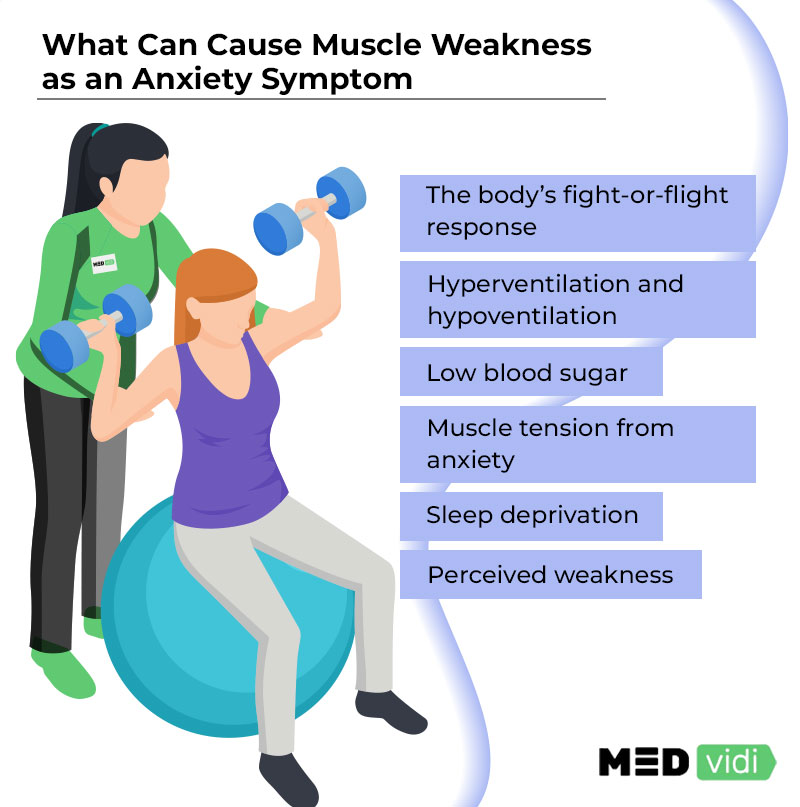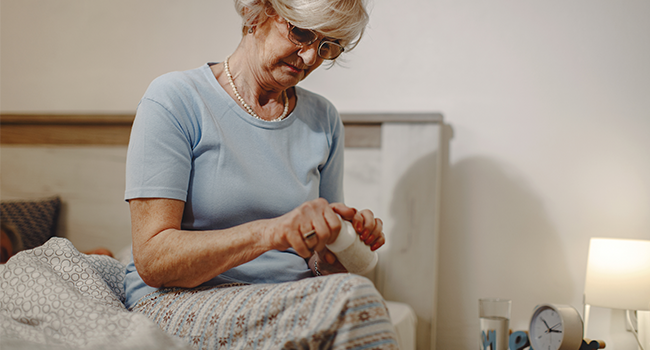Anxiety can come with various
Highlights
- Anxiety can cause both the perception and physical experience of muscle weakness, especially during panic attacks or chronic stress.
- Muscle weakness from anxiety may be triggered by hyperventilation, sleep issues, and long-term muscle tension.
- Effective treatment options include therapy, medication, and self-care strategies like movement, breathwork, and distraction techniques.
Experiencing muscle weakness can be very scary and can make pre-existing anxiety worse. You might feel so distressed and worried about the weakness in your body that you become overwhelmed and stuck in a rumination loop. Muscle weakness from anxiety can also make day-to-day functioning very difficult. Just moving around or getting out of bed might start to feel nearly impossible.
Fortunately, anxiety can be treated. With therapy and medication (or a combination of both), you can learn to manage all the symptoms of anxiety disorders, including the physical ones like muscle weakness.

Can Anxiety Make You Feel Weak?
Anxiety is a mental health condition, but it absolutely has physical symptoms — including ones that affect your muscles. For example, you might have found that your muscles feel tense when you’re anxious — your shoulders and neck may hurt, and you might find it hard to relax your body. This is because of the stress response, which helps to get your body ready for fight or flight.
Physical weakness with anxiety isn’t as common as muscle tension, but it can happen when you’re experiencing more intense anxiety or panic attacks. Sometimes, it can even seem to come out of nowhere — for example, you might suddenly feel weak in your legs.
And it’s not just “in your head.” A
What Does Muscle Weakness From Anxiety Feel Like?
Muscle weakness from anxiety can range from mild to severe. Sometimes, you might barely notice it — other times, it can have significant effects on your daily life.
When caused by anxiety, one or more muscles may feel weak, numb, heavy, or worn out to the extent that it becomes impossible to relax, loosen, or move a group of muscles. You may also feel exhausted as muscles do not support your weight or body movements.
You might experience:
- Weakness in legs — legs that feel shaky, rubbery, or about to give out; this might feel like “jelly legs.”
- Arms feel weak — sudden heaviness or fatigue in the arms or limbs.
- Difficulty gripping or lifting objects.
- A general sense of physical exhaustion or depletion.
- Trouble standing, walking, or completing basic tasks.
This muscle weakness due to anxiety can even mimic symptoms of other severe illnesses like multiple sclerosis (MS), amyotrophic lateral sclerosis (ALS), or Parkinson’s Disease. So it’s essential to see a healthcare provider right away if you ever experience sudden muscle weakness, especially if it’s only on one side of your body.
If you feel significantly physically weak with no clear cause, or if you have weakness in one arm, or weakness on the left side of your body, seek medical help immediately.
How Long Does Anxiety Muscle Weakness Last?
Muscle weakness caused by anxiety can last anywhere from a few minutes to several hours. For some people, it resolves quickly once the anxiety episode subsides. For others, especially those with chronic anxiety, the sensation of weakness may go on for longer. Anxiety treatment can help reduce how often and how long this symptom lasts.
Why Does Anxiety Cause Weakness and Fatigue?
The link between muscle weakness and anxiety is complex, and can involve many different factors. Anxiety can result in both a “feeling” of muscle weakness and real (objective) muscle weakening.
Here are the most typical reasons for anxiety to cause muscle weakness symptoms:
- The fight-or-flight response: During periods of intense anxiety, your body floods with stress hormones like adrenaline. These physiological changes can drain your muscles of energy and lead to a sensation of collapse or exhaustion.
- Hyperventilation or shallow breathing: Breathing too quickly or holding your breath can
lower carbon dioxide levels in your blood[3] . This can make you feel dizzy, faint, and weak. - Blood sugar: Anxiety flare ups can
affect your body’s blood sugar levels[4] . When your blood sugar is too low or too high, you might feel weak, shaky, or lightheaded. - Chronic muscle tension: Holding your muscles in a tense state over time can lead to fatigue and weakness. Overworked muscles become less effective and more prone to soreness.
- Sleep deprivation: Anxiety often interferes with sleep. Poor sleep can directly contribute to a lack of energy and muscle fatigue.
- Hyperfocus and health anxiety: When you’re too highly attuned to your body due to anxiety, you might perceive normal sensations as muscle weakness. This can make symptoms like muscle weakness feel worse than they actually are.
It’s also important to keep in mind that the relationship isn’t necessarily causal, meaning it can go both ways. Studies have found that
But it’s possible that this means that people who have more muscle strength are more likely to strength train — and exercising is also linked with better mental health. So it might not be that anxiety causes muscle weakness, but that training to prevent muscle weakness also prevents anxiety.

How to Overcome Muscle Fatigue From Anxiety
If you’re experiencing muscle weakness or overall fatigue from anxiety, try these self-help strategies.
Move Your Body
Take a walk, do
If you’re stuck in a loop of health anxiety, exercising can also serve to show your brain that your muscles are actually doing alright.

Use Breathing Techniques
Slow, deep breathing can help reverse the physical effects of anxiety. Try inhaling through your nose for four counts, holding for four, and exhaling for six. This type of breathwork helps regulate carbon dioxide levels, rebalances your nervous system, and reduces the physical sensation of weakness.
Distract Yourself
Especially if you have health anxiety and you’re hyperfocusing on perceived muscle weakness, distractions can help. Switch your focus from your muscles to something else — like doing mental exercises or puzzles, spending time outside, listening to music, calling a friend, or meditating.
Seek Professional Help
If none of these self-help techniques helps you get rid of muscle weakness from anxiety, treatment from a qualified mental health professional can help. Many people have found relief from their symptoms through therapy, medication, or a combination of the two.
- Medication: If your anxiety symptoms are affecting your ability to function, a provider may recommend medication. Antidepressants or anti-anxiety medications can help regulate your brain chemistry and reduce physical symptoms like muscle weakness.
- Cognitive-behavioral therapy (CBT): CBT is one of the
most effective therapies for anxiety[9] . It helps you understand how anxious thoughts impact your body and gives you practical tools to manage both cognitive and physical symptoms. - Exposure therapy: If your muscle weakness shows up as part of a panic attack or specific phobia — like your legs giving out when you’re faced with a fear — then exposure therapy might help. This therapy method gently guides you to face your fears in small, manageable steps.

Bottom Line
Can anxiety cause weakness in your muscles? Yes, it can, especially during intense anxiety periods and chronic anxiety. Try to determine the causes so you can deal with the symptoms effectively and get rid of them.
You can prevent muscle weakness from anxiety if you follow your treatment plan. Licensed healthcare professionals at MEDvidi are ready to provide you with high-quality care. We understand how much difficulty your mental health issues may bring into your life and are here to offer personalized treatment.
Sign up and request help by booking an appointment. Start your anxiety treatment online today!
FAQs
Are weak legs a symptom of anxiety?
Anxiety-related muscle weakness can show up as weak legs. But there are also other medical causes for weakened legs, so it’s important to always get evaluated by a medical professional if your legs feel weak or if you have arm weakness for some time without a clear cause.
What does leg anxiety feel like?
“Leg anxiety” sometimes refers to restless leg syndrome, which is a neurological condition that leads to an irresistible urge to move your legs. This is a different condition from anxiety, although
Can anxiety cause weakness on just one side of the body?
The mind is powerful, and it’s possible to get muscle weakness just on one side of your body due to anxiety. But there are also much more serious causes for weakness on one side of your body (especially if it involves your left arm),
How do you get rid of weak legs from anxiety?
Treating the underlying anxiety should help you manage physical symptoms, including weak legs. Mindful movement, like yoga or simple stretching, can also help you learn that your muscles are strong.













